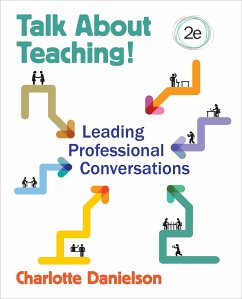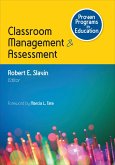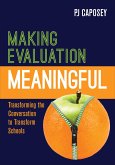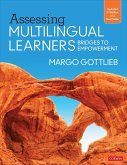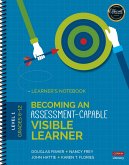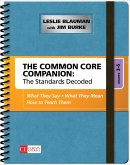- Broschiertes Buch
- Merkliste
- Auf die Merkliste
- Bewerten Bewerten
- Teilen
- Produkt teilen
- Produkterinnerung
- Produkterinnerung
The books aims to help educators understand the value and power of meaningful informal conversations about teaching and to provide all educators with the "mental maps" and practical tools to enable them to conduct meaningful, although frequently informal, professional conversations about practice.
Andere Kunden interessierten sich auch für
![Defensible Teacher Evaluation Defensible Teacher Evaluation]() Richard J. StigginsDefensible Teacher Evaluation37,99 €
Richard J. StigginsDefensible Teacher Evaluation37,99 €![Classroom Management & Assessment Classroom Management & Assessment]() Classroom Management & Assessment33,99 €
Classroom Management & Assessment33,99 €![Making Evaluation Meaningful Making Evaluation Meaningful]() P J CaposeyMaking Evaluation Meaningful44,99 €
P J CaposeyMaking Evaluation Meaningful44,99 €![Assessing Multilingual Learners Assessing Multilingual Learners]() Margo GottliebAssessing Multilingual Learners47,99 €
Margo GottliebAssessing Multilingual Learners47,99 €![Becoming an Assessment-Capable Visible Learner, Grades 6-12, Level 1: Learner′s Notebook Becoming an Assessment-Capable Visible Learner, Grades 6-12, Level 1: Learner′s Notebook]() Douglas FisherBecoming an Assessment-Capable Visible Learner, Grades 6-12, Level 1: Learner′s Notebook18,99 €
Douglas FisherBecoming an Assessment-Capable Visible Learner, Grades 6-12, Level 1: Learner′s Notebook18,99 €![The Common Core Companion: The Standards Decoded, Grades 3-5 The Common Core Companion: The Standards Decoded, Grades 3-5]() Leslie A. BlaumanThe Common Core Companion: The Standards Decoded, Grades 3-543,99 €
Leslie A. BlaumanThe Common Core Companion: The Standards Decoded, Grades 3-543,99 €![Integrating Assessment Into Early Language Learning and Teaching Integrating Assessment Into Early Language Learning and Teaching]() Integrating Assessment Into Early Language Learning and Teaching177,99 €
Integrating Assessment Into Early Language Learning and Teaching177,99 €-
-
-
The books aims to help educators understand the value and power of meaningful informal conversations about teaching and to provide all educators with the "mental maps" and practical tools to enable them to conduct meaningful, although frequently informal, professional conversations about practice.
Hinweis: Dieser Artikel kann nur an eine deutsche Lieferadresse ausgeliefert werden.
Hinweis: Dieser Artikel kann nur an eine deutsche Lieferadresse ausgeliefert werden.
Produktdetails
- Produktdetails
- Verlag: SAGE Publications Inc
- 2 Revised edition
- Seitenzahl: 160
- Erscheinungstermin: 6. Oktober 2015
- Englisch
- Abmessung: 231mm x 207mm x 12mm
- Gewicht: 302g
- ISBN-13: 9781483373799
- ISBN-10: 1483373797
- Artikelnr.: 41755589
- Herstellerkennzeichnung
- Produktsicherheitsverantwortliche/r
- Europaallee 1
- 36244 Bad Hersfeld
- gpsr@libri.de
- Verlag: SAGE Publications Inc
- 2 Revised edition
- Seitenzahl: 160
- Erscheinungstermin: 6. Oktober 2015
- Englisch
- Abmessung: 231mm x 207mm x 12mm
- Gewicht: 302g
- ISBN-13: 9781483373799
- ISBN-10: 1483373797
- Artikelnr.: 41755589
- Herstellerkennzeichnung
- Produktsicherheitsverantwortliche/r
- Europaallee 1
- 36244 Bad Hersfeld
- gpsr@libri.de
Charlotte Danielson, a former economist, is an internationally-recognized expert in the area of teacher effectiveness, specializing in the design of teacher evaluation systems that, while ensuring teacher quality, also promote professional learning. She advises State Education Departments and National Ministries and Departments of Education, both in the United States and overseas. She is in demand as a keynote speaker at national and international conferences, and as a policy consultant to legislatures and administrative bodies. Ms Danielson is a graduate of Cornell University (history), Oxford University (philosophy, politics, and economics) and Rutgers University (educational administration and supervision.) She has taught at all levels, kindergarten through university), and has worked as a curriculum director and staff development director, and is the founder of The Danielson Group. Her Framework for Teaching has become the most widely-used definition of teaching in the United States, and has been adopted as the single model, or one of several approved models, in over 20 states. Ms. Danielson¿s many publications range from defining good teaching ("Enhancing Professional Practice: a framework for teaching," 2007), to organizing schools for student success ("Enhancing Student Achievement: a framework for school improvement," 2002), to teacher leadership ("Teacher Leadership that Strengthens the Profession," 2006), to professional conversations ("Talk about Teaching! Conducting Professional Conversations," 2009), to numerous practical instruments and training programs (both onsite and online) to assist practitioners in implementing her ideas. Click here for more info on Talk about Teaching!
Acknowledgements
About the Author
Preface
1. Why Professional Conversation?
The Imperative for Improvement in Teaching
The Nature of Teacher Learning
Promoting Professional Learning Through Conversation
Assumptions Underlying Professional Conversations
Summary
2. Power and Leadership in Schools
Overview
The Reality of Power
Reconciling Power and Leadership
Summary
3. The Big Ideas that Shape Professional Conversations
What Constitutes Important Learning?
What Causes Learning?
How Are Students Motivated?
The Merging of All These Ideas
Summary
4. The Topics for Conversations
Power, Leadership, and the "Big Ideas"
Summary
5. Conversation Skills
Setting the tone for conversation
Linguistic Skills
Paraphrasing
Summary
6. Informal Professional Conversations
Purpose
Settings for Professional Conversations
Procedure
Summary
7. Implementation Issues
Finding Time for Conversation
Communicating the Purpose
Establishing Trust
Forging Understanding and Consensus on the "Big Ideas"
Elaborating the "Topics for Conversation"
Summary
8. Conversation Activities for Implementation
Establishing the Foundation
Communicating the Purpose
Establishing Trust
The Big Ideas: Considering High-Level Learning
How do People Learn?
Worthwhile learning experiences
Human Motivation
Topics for Conversation
Summary
References
Index
About the Author
Preface
1. Why Professional Conversation?
The Imperative for Improvement in Teaching
The Nature of Teacher Learning
Promoting Professional Learning Through Conversation
Assumptions Underlying Professional Conversations
Summary
2. Power and Leadership in Schools
Overview
The Reality of Power
Reconciling Power and Leadership
Summary
3. The Big Ideas that Shape Professional Conversations
What Constitutes Important Learning?
What Causes Learning?
How Are Students Motivated?
The Merging of All These Ideas
Summary
4. The Topics for Conversations
Power, Leadership, and the "Big Ideas"
Summary
5. Conversation Skills
Setting the tone for conversation
Linguistic Skills
Paraphrasing
Summary
6. Informal Professional Conversations
Purpose
Settings for Professional Conversations
Procedure
Summary
7. Implementation Issues
Finding Time for Conversation
Communicating the Purpose
Establishing Trust
Forging Understanding and Consensus on the "Big Ideas"
Elaborating the "Topics for Conversation"
Summary
8. Conversation Activities for Implementation
Establishing the Foundation
Communicating the Purpose
Establishing Trust
The Big Ideas: Considering High-Level Learning
How do People Learn?
Worthwhile learning experiences
Human Motivation
Topics for Conversation
Summary
References
Index
Acknowledgements
About the Author
Preface
1. Why Professional Conversation?
The Imperative for Improvement in Teaching
The Nature of Teacher Learning
Promoting Professional Learning Through Conversation
Assumptions Underlying Professional Conversations
Summary
2. Power and Leadership in Schools
Overview
The Reality of Power
Reconciling Power and Leadership
Summary
3. The Big Ideas that Shape Professional Conversations
What Constitutes Important Learning?
What Causes Learning?
How Are Students Motivated?
The Merging of All These Ideas
Summary
4. The Topics for Conversations
Power, Leadership, and the "Big Ideas"
Summary
5. Conversation Skills
Setting the tone for conversation
Linguistic Skills
Paraphrasing
Summary
6. Informal Professional Conversations
Purpose
Settings for Professional Conversations
Procedure
Summary
7. Implementation Issues
Finding Time for Conversation
Communicating the Purpose
Establishing Trust
Forging Understanding and Consensus on the "Big Ideas"
Elaborating the "Topics for Conversation"
Summary
8. Conversation Activities for Implementation
Establishing the Foundation
Communicating the Purpose
Establishing Trust
The Big Ideas: Considering High-Level Learning
How do People Learn?
Worthwhile learning experiences
Human Motivation
Topics for Conversation
Summary
References
Index
About the Author
Preface
1. Why Professional Conversation?
The Imperative for Improvement in Teaching
The Nature of Teacher Learning
Promoting Professional Learning Through Conversation
Assumptions Underlying Professional Conversations
Summary
2. Power and Leadership in Schools
Overview
The Reality of Power
Reconciling Power and Leadership
Summary
3. The Big Ideas that Shape Professional Conversations
What Constitutes Important Learning?
What Causes Learning?
How Are Students Motivated?
The Merging of All These Ideas
Summary
4. The Topics for Conversations
Power, Leadership, and the "Big Ideas"
Summary
5. Conversation Skills
Setting the tone for conversation
Linguistic Skills
Paraphrasing
Summary
6. Informal Professional Conversations
Purpose
Settings for Professional Conversations
Procedure
Summary
7. Implementation Issues
Finding Time for Conversation
Communicating the Purpose
Establishing Trust
Forging Understanding and Consensus on the "Big Ideas"
Elaborating the "Topics for Conversation"
Summary
8. Conversation Activities for Implementation
Establishing the Foundation
Communicating the Purpose
Establishing Trust
The Big Ideas: Considering High-Level Learning
How do People Learn?
Worthwhile learning experiences
Human Motivation
Topics for Conversation
Summary
References
Index

